
Games like monster hunter world ps4 Archives
games like monster hunter world ps4 Archives
6 things you need to know about Monster Hunter: World’s PS Plus beta, live this weekend
Hi, I’m Yuya Tokuda and I’m the director of Monster Hunter: World. Speaking on behalf of the whole development team, I’m delighted to be able to bring the beta test of Monster Hunter: World to players worldwide.
This is the first time we’ve released a Monster Hunter game in all regions simultaneously, and also the first time the online multiplayer servers have supported global matchmaking, so it truly is the most worldwide Monster Hunter game yet. That’s why we decided to release a beta in order to stress test the servers.
I hope you enjoy the selection of quests we’ve included in the beta and get the most out of it while it’s available. By playing the beta and enjoying the hunting action of Monster Hunter: World, you’ll also be helping us out a lot! A huge, living, breathing world of thrilling action awaits you.
Today I’m going to explain what’s in the beta and how the get the most out of it, especially if you’re a newcomer to Monster Hunter and aren’t sure how to get into the game. Don’t worry, you’ll love it!
1. The backstory to your mission and quests
While the beta features several quests, the main game has an engaging storyline for you to follow. You’ll embark on a mission to the New World, a newly discovered continent, and join an expedition to discover more about this mysterious land. This is actually the fifth time a research party has been sent, following in the wake of the Elder Dragons which cross the ocean every 10 years to the New World. To discover the fate of your hunter and the rest of the team, you’ll have to play the full game!
2. Your weapons: what they are, how they work, and our recommended loadout
Monster Hunter: World features 14 different weapon types, each with its own unique moves and gameplay, and you can try out all of them in the beta. We’ve included a short video showing you how the weapon looks, and you can also hop into the training area to give them a try for yourself. (You can change your weapon inside the training area too!)
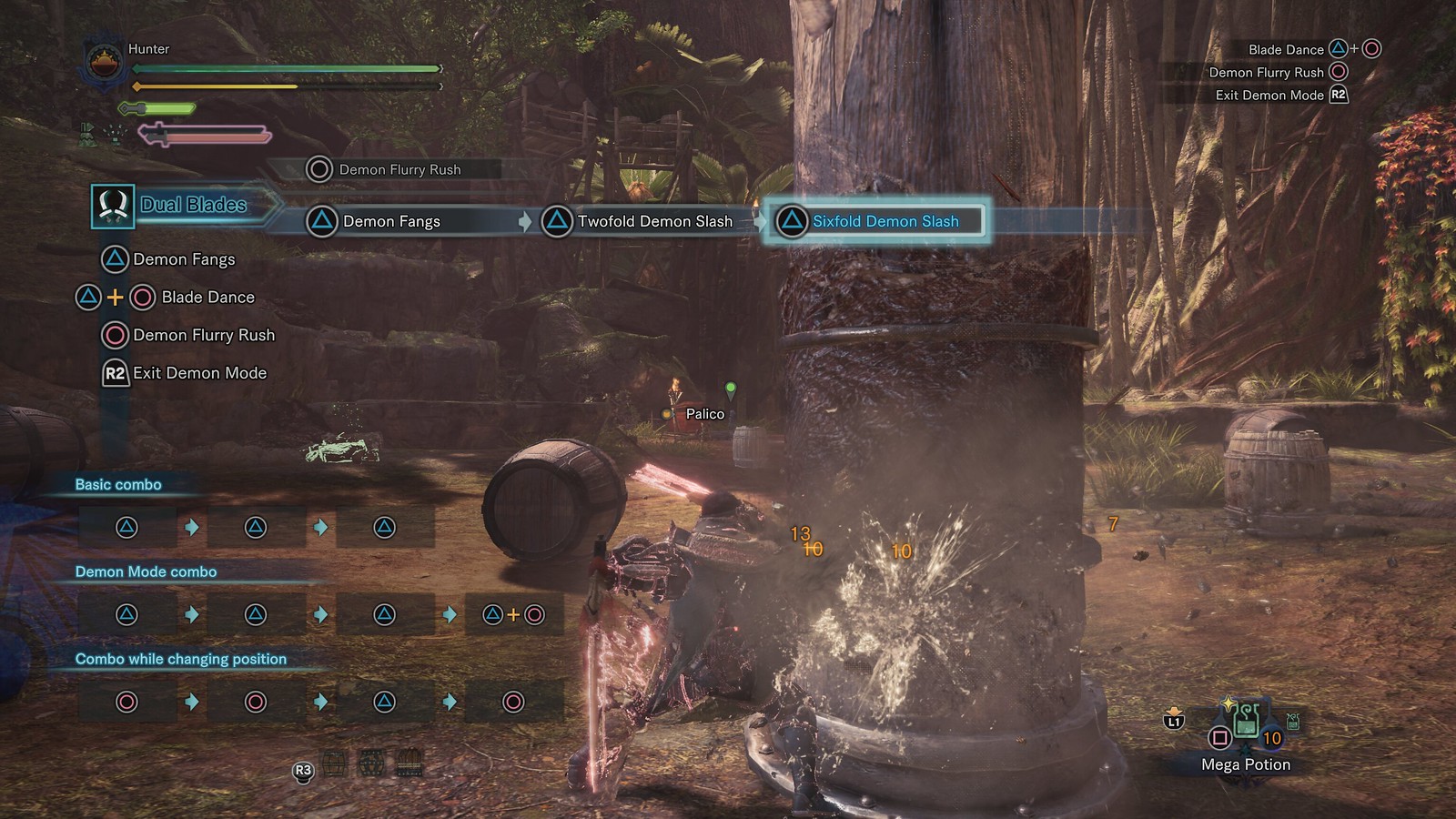
The game plays quite differently depending on your choice of weapon, so for newcomers to Monster Hunter, I’d recommend choosing one of the faster weapons, such as the Dual Blades or the Long Sword. These are actually the two weapons I personally use when I’m first testing out a new monster during development, as they let you move around quickly so you can easily get a read of the monster’s behaviour.
We also have some ranged weapons available to use: two kinds of Bowgun (Light and Heavy) and the Bow. These weapons have been rather tricky to control in the past, so for Monster Hunter: World, we’ve made them a lot easier to use. If you’re used to playing shooter games, I think you’ll be able to pick these up pretty quickly and get right into the hunt.
3. Choose from a range of preset hunters
The full game features a detailed character creator which will let you create your ultimate hunter. For the beta, we’ve kept things simple and provided you with some preset hunters to choose from.
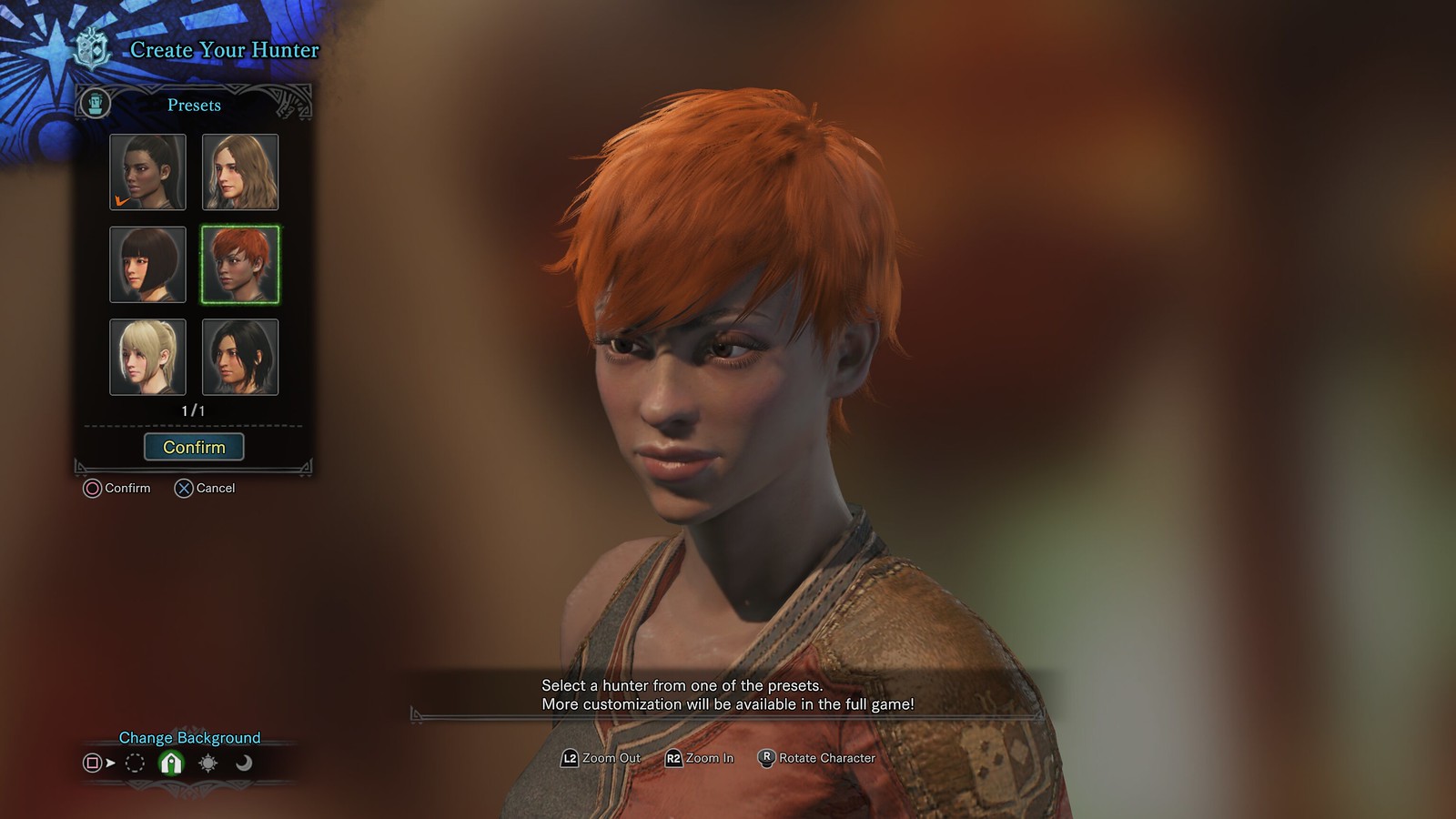
4. How to start a co-op party and how to communicate with other hunters
Co-operative multiplayer is a great way to take down the huge beasts in this game. To hunt with your friends, all you need to do is start a session and share the ID with your friends so they can input it and join you. But even if you haven’t got anyone you know to play with, go ahead and join up with other players from around the world. There’s a variety of ways to communicate with one another – not just PS4 voice chat and text chat, but also set phrases that will automatically show up in the right language for everyone, and some fun stickers and gestures.
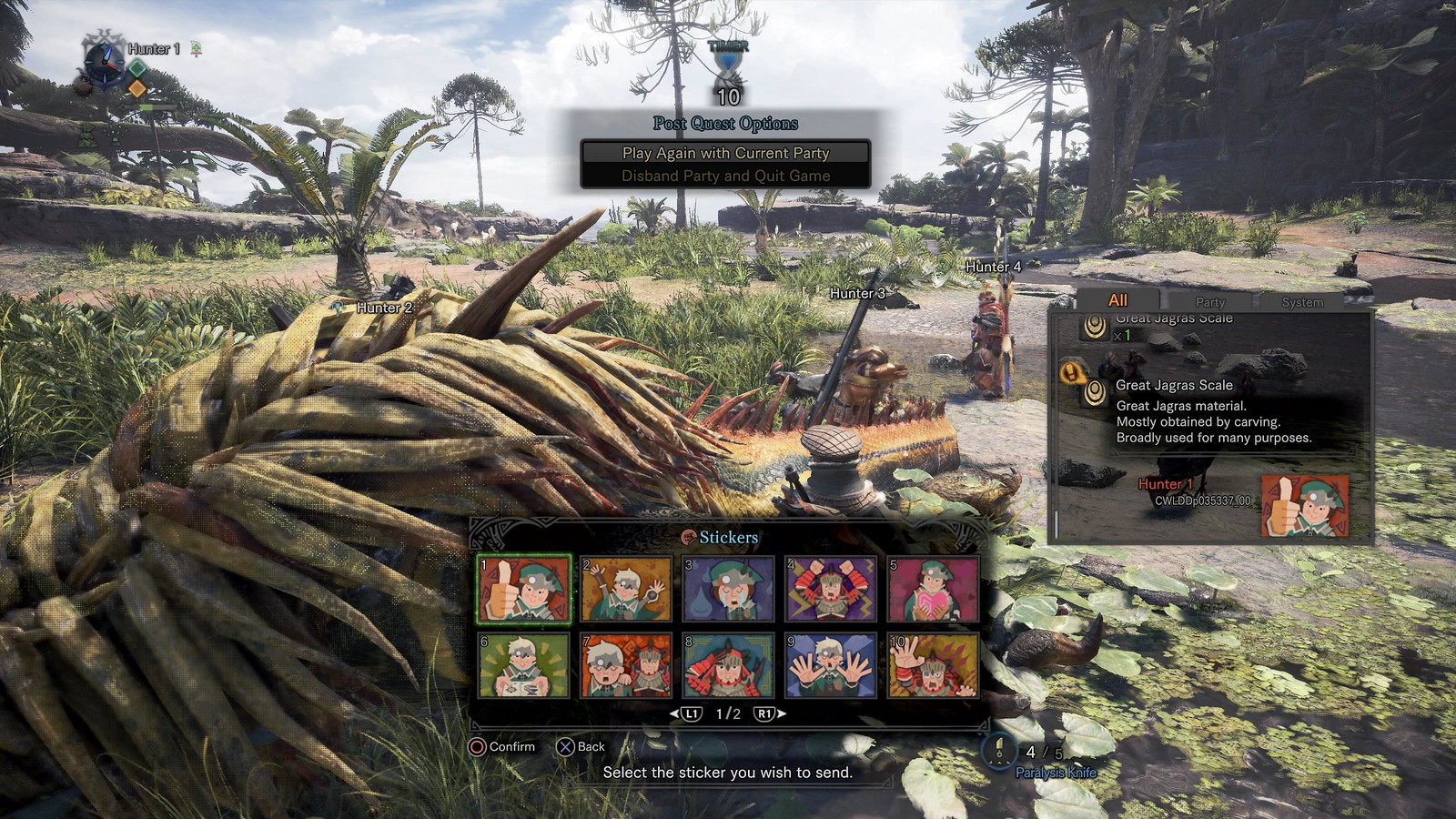
One of the best things about Monster Hunter is the amazing community spirit. Back in the day, I once joined a quest online to fight against a monster that I’d actually created myself. I thought that being its creator meant I could take it on by myself, and ran straight in with my sword swinging, but I was too cocky – I got taken out pretty quickly. It was embarrassing but the rest of the hunting party helped me get back on my feet and, together, we took the beast down!
I still hunt together with some of those hunters to this day. It just goes to show you that even the most experienced hunters make mistakes, so take it easy on them! You never know, you might be able to make some new hunting pals and add each other to your PSN friends.
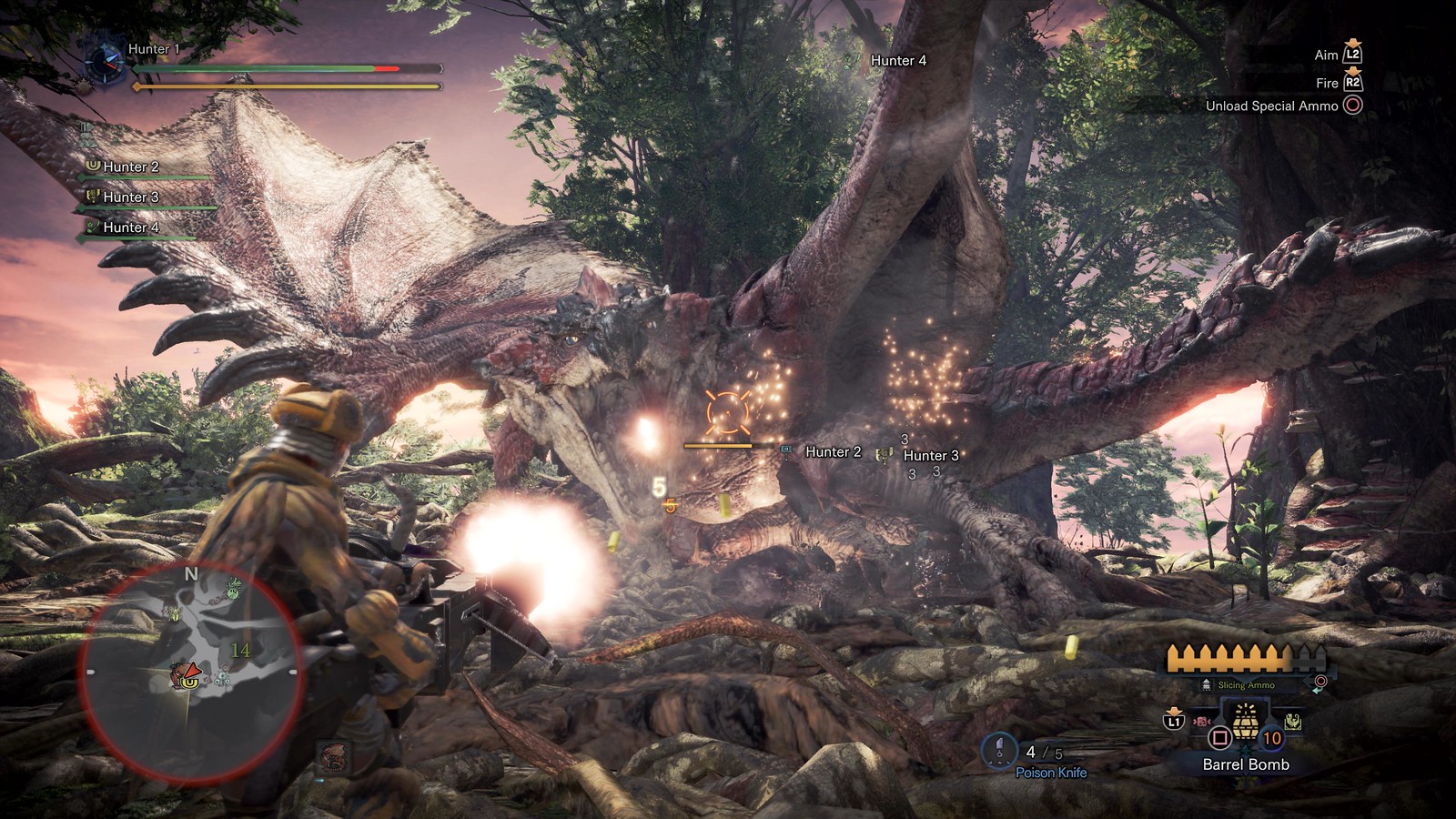
5. The two different maps you can explore
The beta features three quests set in two different maps: the Ancient Forest and the Wildspire Waste. I wanted this game to have each map be its own ecosystem, with believable interactions between all the living things in it, even down to the plants.
Have fun exploring each map – they’re very different from each other, from the verdant splendour and dense foliage of the Ancient Forest to the arid landscapes and mucky swamps of the Wildspire Waste. There are even more maps to come in the full game, so this is just a taste of the incredibly detailed maps in Monster Hunter: World.
6. The bigger monsters for those wanting an extra challenge
I think I’ve covered pretty much all you need to know to get into the beta. I’m excited to see how you all find it – but I imagine that there will be some of you expert players out there who want an extra challenge.
If so, you should try finding the large monsters in each map who aren’t the main quest target – that’s Rathalos in the Ancient Forest, and Diablos in the Wildspire Waste.
These guys are truly tough customers, and will test all your skills – not just with weapons, but understanding and utilising your environment and, in multiplayer, working as a team with your fellow hunters. Getting to know each map is especially important: for example, the dam in the treetops of the Ancient Forest can be used for some “explosive” action…
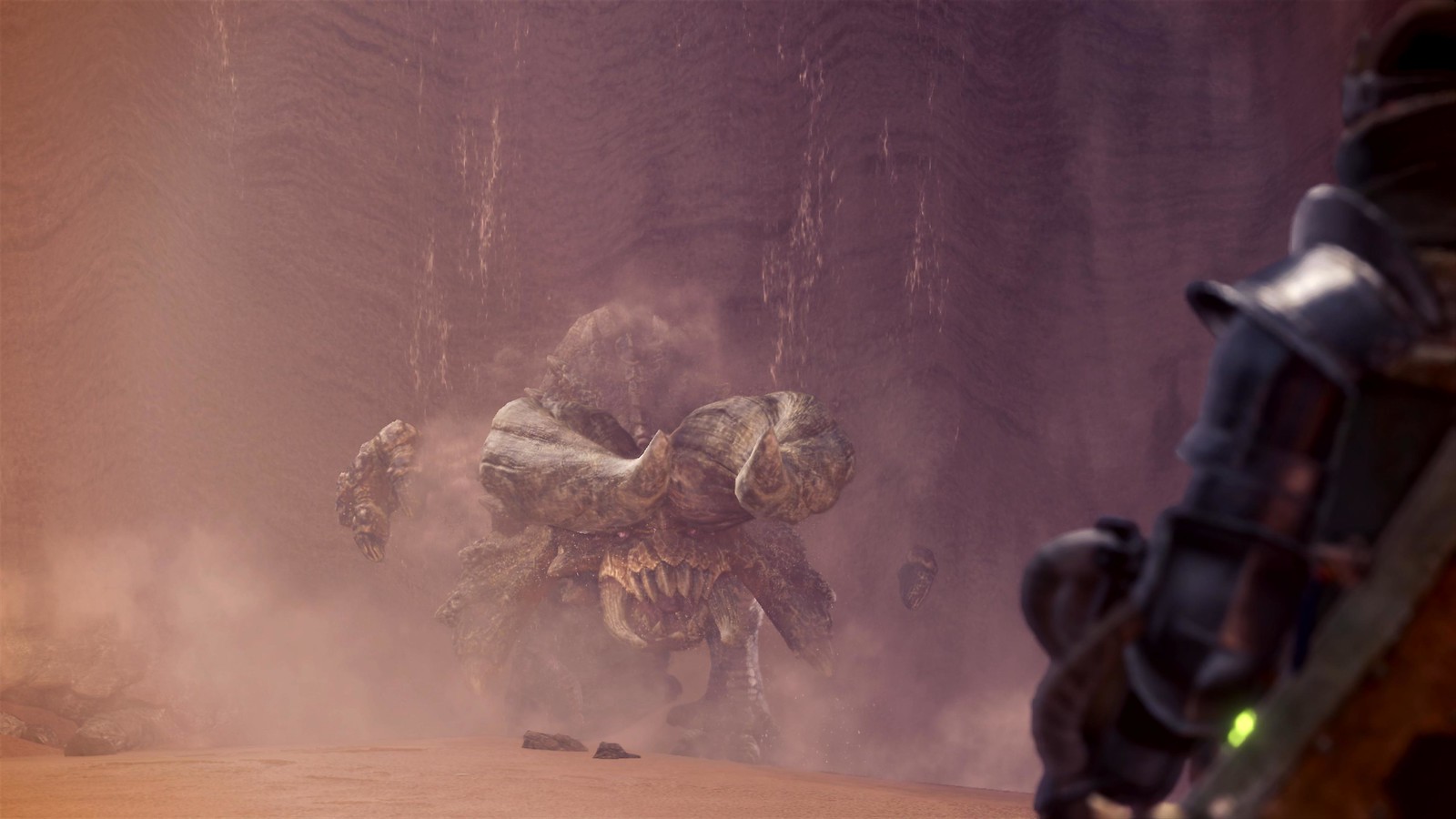
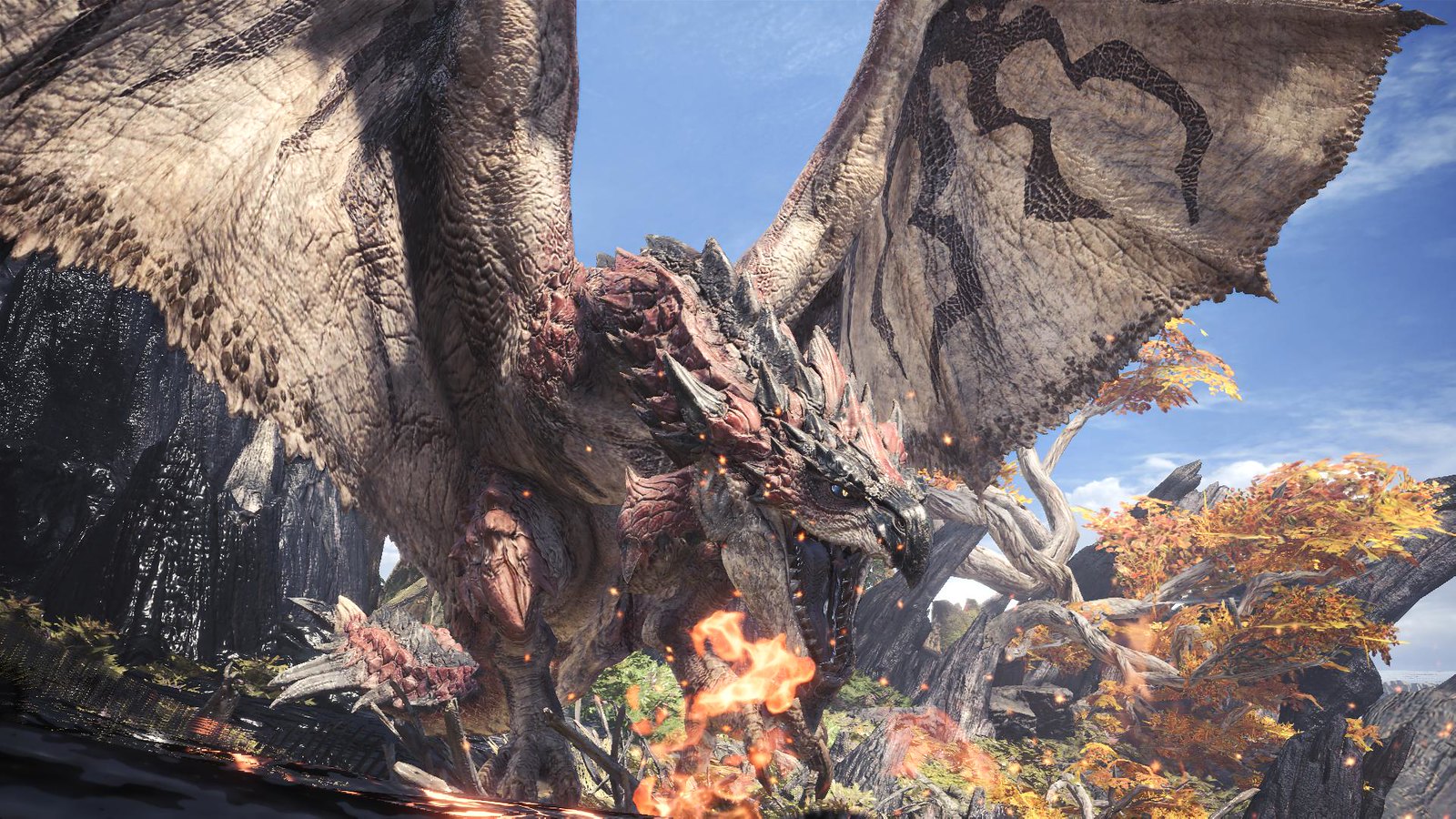
Rathalos and Diablos are both at the top of the food chain in their respective maps, so I spent a lot of time working on them, from making them visually impressive to the gameplay balance while hunting them. They’re very challenging, but if you can successfully take them down, the sense of achievement and satisfaction you get is second to none, and that’s what makes Monster Hunter so special.
Anyway, that’s enough from me! Get out there and get hunting!
Pre-load for Monster Hunter: World beta starts at midnight tonight, and the beta goes live at 6pm CET on Saturday, 9th December and runs until 6pm CET on Tuesday, 12th December. You’ll need PS Plus to access the beta.
Monster Hunter World
Forgive me father for I have sinned. It has been two months since my last Regularly Playing column. The idea behind this is that I throw out and update once a month talking about what I am playing and what has faded away. It also serves as an opportunity for me to “true up” my regularly playing widget in the sidebar of this blog. However had I updated at the beginning of October you would have largely just seen a single entry for Destiny 2. I was in a pretty unhappy place with Blizzard and it really made me not want to spend much time writing about what I was doing other than Destiny.
However we have a new month and with it comes some new perspectives. I’ve allowed myself to step back from that precipice even though I feel like a bit of a fraud for doing so. I was making myself unhappy by dwelling so much on the bad feelings. I am back dipping my toe into Blizzard things, but I am still largely feeling awful for doing so. However lets get to the list so I can start talking more about each one of them.
To Those Remaining
I’ve been playing an excessive amount of Destiny 2 and if you have read my blog over the last month or so you will have noticed this. Destiny is in a truly amazing state right now and the Cross Save functionality has created this hotbed of players on the PC platform. Over night it seems that PC went from the lowest population platform to the highest as folks are taking advantage of just how much better the experience is on the PC as opposed to the aging console generation. I still only have a handful of people regularly playing but it helps greatly to have Thalen who is also going through a similar renaissance. I’ve more or less given up on most of the AggroChat crew understanding or even latching onto how great this game.
This game was periodically off the menu… but as soon as I eased up on my stance regarding the Blizzard/Hong Kong situation it was one of the first things I logged into. With all of the news about Diablo 4 it has renewed my interests in playing some Diablo 3. I more or less failed miserably at this season but I did managed to knock out the cosmetics for it. I am hoping to get back on track with the new season starting soon and return to semi-regularly playing this with Grace.
This continues to be a nightly thing that I play as I am winding down from the day. I am not super active in it, but generally speaking I play enough each night to knock out the daily objectives. I am not sure what it is about this pattern that I find relaxing but generally speaking as I am wrapping up the last few things I am finding myself fighting to stay awake and can lay down the tablet and slumber peacefully. The release cadence as I have said before really is the piece that keeps me engaged, and the fact that I get a gacha summon pretty often through simply playing the game normally. They are not getting money from me, but they are getting a bunch of active usage.
I’m leaving this one on the list but I have to admit it is hanging by a thread here. I initially stopped playing Classic over the Hong Kong incident as I stopped playing any Blizzard games. However upon resuming play I am finding it exceptionally hard to get back into the slower pace of this game. I’ve become used to the run and gun pace of Destiny 2 and my brain is sorta fighting back against this. I had some experience with this when I came back to Classic after the launch of Destiny 2 Shadowkeep. In theory I probably need a bit more time to figure out how to slide back in and resume my path to 60.
To The New And Returning
While I am in a bit of a holding pattern thanks to activity in Destiny 2, I eased into The Outer Worlds a few weekends ago and am looking forward to maybe getting in and playing some more this weekend. This is pretty much the perfect logical successor to my favorite of the Fallout series, New Vegas. It is a weird remix of Fallout, Firefly, Bioshock and Mass Effect and were I not as addicted to Destiny as I currently am it would have become my primary game. I am sure I will get back in and play some more, hopefully prior to the podcast on Saturday.
This is one I did not expect, but after my ceasing of hostilities towards Blizzard… I am finding myself playing a lot more of Retail than I am of Classic. I got in the other night and did the 15th anniversary quests, but I am also finding myself just running around on the Demon Hunter a bit. The other thing I found odd was that I attempted to log into my Alliance characters and found myself turning my nose up at them because they just didn’t feel right. I guess I made a legitimate transition over to The Horde at some point? I blame Grace.
To Those Departing
I am sure I will pick this game back up at some point but I have had another things on my mind. In truth I will always be more of an MMO player than I ever am a purveyor of Single Player games. This one will get attention because I still have yet to beat it. I just haven’t been in the mood for it of late.
Capcom
Capcom Co., Ltd. (Japanese: 株式会社カプコン, Hepburn: Kabushiki-gaisha Kapukon) is a Japanese video game developer and publisher.[4] It has created a number of multi-million-selling game franchises, including Street Fighter, Mega Man, Darkstalkers, Resident Evil, Devil May Cry, Onimusha, Dino Crisis, Dead Rising, Sengoku Basara, Ghosts 'n Goblins, Monster Hunter, Breath of Fire, and Ace Attorney as well as games based on Disney animated properties. Established in 1979,[5] it has become an international enterprise with subsidiaries in North America, Europe, and Japan.[6]
History[edit]
Capcom's predecessor, I.R.M. Corporation, was founded on May 30, 1979[7] by Kenzo Tsujimoto. Tsujimoto was still president of Irem Corporation when he founded I.R.M. Tsujimoto worked concomitantly in both companies until leaving the former in 1983.
The original companies that spawned Capcom's Japanese branch were I.R.M. as well as its subsidiary Japan Capsule Computers Co., Ltd., both of which were devoted to the manufacturing and distribution of electronic game machines.[5] The two companies underwent a name change to Sambi Co., Ltd. in September 1981,[5] while Capcom Co., Ltd. was first established on June 11, 1983 by Kenzo Tsujimoto,[7] for the purpose of taking over the internal sales department.[8]
In January 1989, the old affiliate company Capcom Co., Ltd. merged with Sambi Co., Ltd., resulting in the current Japanese branch.[5] The name Capcom is a clipped compound of "Capsule Computers", a term coined by the company to describe the arcade machines it solely manufactured in its early years, designed to set themselves apart from personal computers that were becoming widespread at that time.[9] The word capsule alludes to how Capcom likened its game software to "a capsule packed to the brim with gaming fun", as well as to the company's desire to protect its intellectual property with a hard outer shell, preventing illegal copies and inferior imitations.[9]
While Capcom's first product was the coin-operated Little League from July 1983, its first real video game, the arcade titleVulgus, was released in May 1984.[5] Beginning with a Nintendo Entertainment System port of 1942 published in December 1985, the company started to venture into the market of home console video games,[5] which became its main business segment a few years later.[10] Its division Capcom USA had a brief stint in the late 1980s as a video game publisher for the Commodore 64 and IBM PC DOS computers although the development of these arcade ports were handled by other companies. Capcom has created 15 multi-million-selling game series, the most successful of which is Resident Evil.[11]
Capcom has been noted as the last major publisher to be committed to 2D games, though this was not entirely by choice. The company's commitment to the Super Nintendo Entertainment System as its platform of choice caused them to lag behind other leading publishers in developing 3D-capable arcade boards.[12] In addition, the 2D animated cartoon-style graphics seen in games such as Darkstalkers: The Night Warriors and X-Men: Children of the Atom proved popular, leading Capcom to adopt it as a signature style and use it in more games.[12]
In 1994, Capcom adapted its Street Fighter series of fighting games into a film of the same name. While commercially successful, it was critically panned. A 2002 adaptation of its Resident Evil series faced similar criticism but was also successful in theaters. The company sees films as a way to build sales for its video games.[13]
Capcom partnered with Nyu Media in 2011 to publish and distribute the Japanese independent (dōjin soft) games that Nyu localized into the English language.[14] The company works with the Polish localization company QLoc to port Capcom's games to other platforms,[15] notably examples are DmC: Devil May Cry's PC version and its PlayStation 4 and Xbox One remasters, Dragon's Dogma's PC version released in January 2016, and Dead Rising's version on PlayStation 4, Xbox One and PC released on September 13, 2016.
On August 27, 2014, Capcom filed a patent infringement lawsuit against Koei Tecmo Games at the Osaka District Court for 980 million yen in damage. Capcom claimed Koei Tecmo Games infringed a patent it obtained in 2002 regarding a play feature in video games.[16]
Corporate structure[edit]
Development studios[edit]
In the first few years after its establishment, the Japanese branch of Capcom had three development groups referred to as "Planning Rooms", led by Tokuro Fujiwara, Takashi Nishiyama and Yoshiki Okamoto, respectively.[17][18] Later, games developed internally used to be created by several numbered "Production Studios", each assigned to different games.[19][20] Starting in 2002, the development process was reformed to better share technologies and expertise, and all of the individual studios were gradually restructured into bigger departments responsible for different tasks.[20] While there are self-contained departments for the creation of arcade, pachinko and pachislo, online, and mobile games, the Consumer Games R&D Division instead is an amalgamation of subsections in charge of various game development stages.[20][21][22]
Capcom has three internal divisions to develop games. Those are Consumer Games Development Division 1 headed by Jun Takeuchi with Resident Evil, Devil May Cry, Dead Rising, and other franchises (usually targeted towards North American and European audiences), Consumer Games Development Division 2 headed by Ryozo Tsujimoto (which also heads Mobile Online Development Division) with Monster Hunter, Ace Attorney, Sengoku Basara and other franchises with more traditional IP (usually targeted towards Japanese audiences), and Consumer Games Development Division 3 with Street Fighter, Marvel vs. Capcom, and other online focused franchises (usually targeted towards worldwide audiences).[23][24][25]
In addition to these internal teams, Capcom also commissions outside development studios to ensure a steady output of titles.[26][27] However, following poor sales of Dark Void and Bionic Commando, the company's management has decided to limit outsourcing to sequels and newer versions of installments in existing franchises, reserving the development of original titles for its in-house teams.[28] The production of games, budgets, and platforms supported are decided upon in development approval meetings, attended by the company management and the marketing, sales, and quality control departments.[20]
Branches and subsidiaries[edit]
Apart from the head office building and the R&D building of Capcom Co., Ltd., both located in Chūō-ku, Osaka,[6] the Japanese parent company also has a branch office in the Shinjuku Mitsui Building in Nishi-Shinjuku, Shinjuku, Tokyo.[29] It also has the Ueno Facility, a branch office in Iga, Mie Prefecture.[6]
The international Capcom Group encompasses 15 subsidiaries in Japan, North America, Europe, and East Asia.[6][20] Affiliated companies include Koko Capcom Co., Ltd. in South Korea, Street Fighter Film, LLC in the United States, and Dellgamadas Co., Ltd.[20]
Game-related media[edit]
In addition to the development and publishing of home, online, mobile, arcade, pachinko, and pachislo games, the company publishes strategy guides,[5] maintains its own arcade centers in Japan known as Plaza Capcom, and licenses its franchise and character properties for use in tie-in products, movies, television series, and stage performances.[10]
Suleputer, an in-house marketing and music label established in cooperation with Sony Music Entertainment Intermedia in 1998, publishes CDs, DVDs, and other media based on Capcom's games.[30] An annual private media summit called Captivate, renamed from Gamers Day in 2008, is traditionally used as a platform for new game and business announcements.[31]
Games[edit]
Capcom started its Street Fighter franchise in 1987. The series of fighting games are among the most popular in their genre. Having sold over 30 million units, the series serves as Capcom's flagship franchise. That same year, the company introduced its Mega Man series, which also sells nearly 30 million units.
The company released the first entry in its Resident Evil survival horror series in 1996. The series has achieved financial success, selling over 90 million units. Following work on the second entry in the Resident Evil series, Capcom began work on a Resident Evil game for the PlayStation 2. Radically different from the existing series, Capcom decided to spin off the game into its own series, Devil May Cry. While it released the first two entries exclusively for the PlayStation 2, the company brought further entries to non-Sony consoles. The series as a whole has seen sales in excess of 10 million units. Capcom began its Monster Hunter series in 2004. The series has seen sales of over 45 million units on a variety of consoles. After remaking Resident Evil games 2 & 3 Capcom is now remaking Resident Evil 4.[32]Resident Evil 4 has a larger development team than the series' previous two remakes, including support from Capcom's internal Resident Evil 2 and Devil May Cry 5 teams. Many original Resident Evil 4 developers remain among these teams including producer Hiroyuki Kobayashi. Remake is being directed by a newcomer at M-Two.[33]
Although the company often relies on existing franchises, it also published and developed several titles for the Xbox 360, PlayStation 3 and Wii, based on original intellectual property: Lost Planet: Extreme Condition, Dead Rising, Dragon's Dogma, Asura's Wrath and Zack and Wiki.[34] During this period, Capcom also helped publish several original titles from up and coming Western developers with titles like Remember Me, Dark Void and Spyborgs, titles that many other publishers were not willing to take a chance on.[35][36] Also of note are the titles Ōkami, Ōkamiden and Ghost Trick: Phantom Detective. Currently, Capcom is working on its latest new intellectual property, Deep Down, for the PlayStation 4.
Platinum Titles[edit]
Capcom compiles a list, which is updated on quarterly basis, of its games that have exceeded one million copies sold, called "Platinum Titles". The list contains over 90 video games. The following list contains the top ten titles by sold copies as of June 30, 2020.[37]
| Title | Release date | Platform(s) considered | Sales (m) |
|---|---|---|---|
Monster Hunter World | January 2018 | PlayStation 4, Xbox One, PC | 16.1 |
Resident Evil 7: Biohazard | January 2017 | PlayStation 4, Xbox One, PC | 7.9 |
Resident Evil 5 | March 2009 | PlayStation 3, Xbox 360 | 7.7 |
Resident Evil 6 | October 2012 | PlayStation 3, Xbox 360 | 7.6 |
Resident Evil 2 Remake | January 2019 | PlayStation 4, Xbox One, PC | 7.2 |
| Street Fighter II | June 1992 | Super Nintendo Entertainment System | 6.3 |
Monster Hunter World: Iceborne | September 2019 | PlayStation 4, Xbox One, PC | 5.8 |
| Resident Evil 2 | January 1998 | PlayStation | 4.96 |
Monster Hunter Freedom 3 | December 2010 | PlayStation Portable | 4.9 |
Street Fighter V | February 2016 | PlayStation 4, PC | 4.7 |
Criticism and controversy[edit]
In 2012, Capcom came under criticism for controversial sales tactics, such as the implementation of disc-locked content, which requires players to pay for additional content that is already available within the game's files, most notably in Street Fighter X Tekken. The company has defended the practice.[38] It has also been criticized for other business decisions, such as not releasing certain games outside Japan (most notably the Sengoku BASARA series), abruptly cancelling anticipated projects (most notably Mega Man Legends 3), and shutting down Clover Studio.[citation needed]
In 2015, the PlayStation 4 version of Ultra Street Fighter IV was pulled from the Capcom Pro Tour due to numerous technical issues and gameplay bugs.[39]
In 2016, Capcom released Street Fighter V with very limited single player content. At launch, there were stability issues with the game's network that booted players mid-game even when they were not playing in an online mode.[40]Street Fighter V failed to meet its sales target of 2 million in March 2016.[41]
See also[edit]
Articles[edit]
Companies founded by ex-Capcom employees[edit]
| Name | Foundation | Affiliation |
|---|---|---|
| Crafts & Meister | June 1, 2004 | Founded by Noritaka Funamizu and Katsuhiro Sudo |
| Game Republic | July 1, 2003 | Founded by Yoshiki Okamoto |
| Inti Creates | May 8, 1996 | Founded by Takuya Aizu |
| Level-5 Comcept | December 1, 2010 | Founded by Keiji Inafune as Comcept |
| PlatinumGames | October 1, 2007 | Founded by Shinji Mikami, Atsushi Inaba, Hideki Kamiya, and Tatsuya Minami |
| Tango Gameworks | March 1, 2010 | Founded by Shinji Mikami |
| UTV Ignition Games | September 26, 2001 | Sawaki Takeyasu joined Ignition Tokyo, a subsidiary of UTV Ignition Games |
References[edit]
- ^"CAPCOM - Corporate Overview". Archived from the original on April 15, 2010.
- ^ abc"CAPCOM - Financial Review (Japan GAAP)". Capcom. May 7, 2019. Retrieved July 21, 2019.
- ^"CAPCOM | Corporate Overview". CAPCOM IR.
- ^"Corporate Information: Corporate Overview". Capcom Co., Ltd. March 31, 2010. Archived from the original on April 15, 2010. Retrieved July 22, 2010.
- ^ abcdefg"Corporate Information: History". Capcom Co., Ltd. September 30, 2009. Archived from the original on April 15, 2010. Retrieved July 21, 2010.
- ^ abcd"Corporate Information: Capcom Group". Capcom Co., Ltd. August 31, 2009. Archived from the original on April 22, 2010. Retrieved July 21, 2010.
- ^ abOcampo, Jason (June 11, 2008). "Capcom Marks 25th Anniversary". IGN. IGN Entertainment, Inc. Archived from the original on October 4, 2009. Retrieved July 21, 2010.
- ^ (in Japanese). Capcom Co., Ltd. September 30, 2009. Archived from the original on March 5, 2010. Retrieved July 21, 2010.
- ^ ab"Archived copy" (in Japanese). Capcom Co., Ltd. Archived from the original on March 5, 2010. Retrieved July 22, 2010.CS1 maint: archived copy as title (link)
- ^ ab"Corporate Information: Business Segments". Capcom Co., Ltd. September 30, 2009. Archived from the original on March 1, 2010. Retrieved July 21, 2010.
- ^"Business Strategies & IR Data: Total Sales Units Data". Capcom Co., Ltd. March 31, 2010. Archived from the original on March 27, 2014. Retrieved July 21, 2010.
- ^ ab"Capcom". Next Generation. No. 17. Imagine Media. May 1996. pp. 67–69.
- ^Gaudiosi, John. "Capcom Seeks More Playtime in HWood." Hollywood Reporter 397 (2006): 4,4,29. ProQuest Research Library. Web. May 30, 2012.
- ^Cowan, Danny (December 13, 2011). "Nyu Media, Capcom To Publish Localized Doujin PC Games Starting This Month". IndieGames.com. UBM Tech. Archived from the original on March 4, 2016. Retrieved December 17, 2014.
- ^"Dustforce Sweeping onto Xbox Live Arcade and PSN for PS3, Vita January 2014". Archived from the original on July 5, 2017. Retrieved December 30, 2016.
- ^Matulef, Jeffrey (August 27, 2014). "Capcom files lawsuit against Koei Tecmo for patent infringement". Archived from the original on August 16, 2016.
- ^. Gameside (in Japanese). Micro Magazine (16). February 2009.
- ^Capcom Co., Ltd (March 7, 1989). Strider Hiryū. Capcom Co., Ltd. Scene: staff credits.
- ^Nix, Marc (March 23, 2007). "The Future of PSP – Capcom". IGN. IGN Entertainment, Inc. Archived from the original on February 23, 2011. Retrieved May 11, 2011.
- ^ abcdef"Annual Report 2009"(PDF). Capcom Co., Ltd. September 17, 2009. Archived(PDF) from the original on October 15, 2012. Retrieved July 20, 2010.
- ^"Developer Interview 2008". Capcom Co., Ltd. Archived from the original on October 4, 2010. Retrieved July 24, 2010.
- ^"Annual Report 2007"(PDF). Capcom Co., Ltd. Archived(PDF) from the original on October 20, 2012. Retrieved July 22, 2010.
- ^Capcom. "Developer Interview 2015".
- ^https://www.gamesindustry.biz/articles/2015-10-13-capcoms-resident-evil-division-focusing-on-vr
- ^http://www.capcom.co.jp/ir/english/company/officer02.html
- ^"Developer Interview 2009: vol08.Keiji Inafune". Capcom Co., Ltd. Archived from the original on April 7, 2010. Retrieved November 6, 2010.
- ^"Developer Interview 2010: vol01.Jun Takeuchi". Capcom Co., Ltd. Archived from the original on October 3, 2010. Retrieved November 6, 2010.
- ^Orsini, Lauren (May 17, 2010). "Bionic Commando, Dark Void Last Straws For Capcom". Kotaku. Archived from the original on June 20, 2010. Retrieved November 6, 2010.
- ^"LocationsArchived October 7, 2011, at the Wayback Machine." Capcom. Retrieved on August 12, 2011. "3-1-3 Uchihirano-machi, Chuo-ku, Osaka 540-0037, Japan" and "Shinjuku Mitsui Building 2-1-1 Nishi Shinjuku, Shinjuku-ku, Tokyo"
- ^"Annual Report 1998"(PDF). Capcom Co., Ltd. Retrieved January 31, 2018.
- ^Kramer, Chris (March 28, 2008). ""Gamers Day" is dead, long live the CAPTIVATE08 Media Summit". Capcom Entertainment, Inc. Archived from the original on November 5, 2010. Retrieved July 24, 2010.
- ^"Capcom is working on a Resident Evil 4 remake". VGC. April 12, 2020. Retrieved April 27, 2020.
- ^"More Resident Evil 4 remake details emerge: 'Larger team' than 3". VGC. April 13, 2020. Retrieved April 27, 2020.
- ^"Lost Planet & Dead Rising; Capcom Brings New Blood to Xbox 360." EGM [i] 2006: 1-41. ProQuest Research Library. Web. May 30, 2012.
- ^Douglass C. Perry (August 21, 2009). "How Airtight Games started a console game studio with just $24,000". VentureBeat. Archived from the original on February 4, 2015. Retrieved February 8, 2015.
- ^Stephany Nunneley (November 27, 2012). "Remember Me developer discusses amicable split with Sony, Capcom's enthusiasim". VG247. Archived from the original on January 28, 2015. Retrieved February 8, 2015.
- ^"Capcom, Platinum Titles". Capcom. June 30, 2020. Retrieved August 14, 2020.
- ^Makuch, Eddie (April 2, 2012). "Capcom defends on-disc DLC - Report". GameSpot. Archived from the original on April 4, 2012.
- ^Wesley Yin-Poole (June 1, 2015). "Capcom pulls PS4 Ultra Street Fighter 4 from its own tournament". Eurogamer. Archived from the original on August 16, 2016. Retrieved July 3, 2016.
- ^"Capcom Responds to Street Fighter 5's Lack of Content Concerns". GameSpot. April 6, 2016. Retrieved January 31, 2018.
- ^"Street Fighter 5 Sales Miss Capcom Target By Huge Margin". GameRant. 2016. Retrieved January 31, 2018.
External links[edit]
What’s New in the games like monster hunter world ps4 Archives?
Screen Shot

System Requirements for Games like monster hunter world ps4 Archives
- First, download the Games like monster hunter world ps4 Archives
-
You can download its setup from given links:


